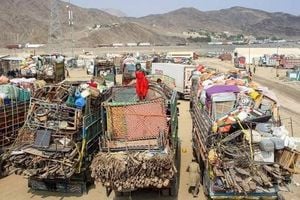In recent weeks, a series of legal battles, public protests, and official actions have thrown the spotlight on the evolving landscape of U.S. immigration enforcement, civil rights, and the treatment of immigrants in detention and public life. From courtrooms in New Jersey and Louisiana to schoolyards in Portland, the tension between federal immigration authorities, state and local governments, and advocacy groups has rarely felt more acute—or consequential.
One of the most high-profile cases currently unfolding is that of Mahmoud Khalil, a lawful permanent resident with a U.S. spouse and child, who has become a focal point in the debate over the Trump administration’s approach to immigration enforcement. According to a press release published on September 17, 2025, Mr. Khalil’s legal team submitted a letter to the federal court in New Jersey, challenging a September 12 decision by an immigration judge in Louisiana that denied him a waiver of removability. The judge’s ruling, based on what Khalil’s attorneys describe as “baseless, pretextual ‘misrepresentation’ charges,” has brought Khalil one step closer to a final order of removal.
“It is no surprise that the Trump administration continues to retaliate against me for my exercise of free speech. Their latest attempt, through a kangaroo immigration court, exposes their true colors once again,” Khalil said in a statement. He continued, “When their first effort to deport me was set to fail, they resorted to fabricating baseless and ridiculous allegations in a bid to silence me for speaking out and standing firmly with Palestine, demanding an end to the ongoing genocide. Such fascist tactics will never deter me from continuing to advocate for my people’s liberation.”
The legal wrangling has been intense. In June 2025, a federal court found the government’s initial rationale for Khalil’s detention—relying solely on Secretary of State Marco Rubio’s authority—was likely unconstitutional, blocking his detention and deportation on that basis. In response, the government shifted its justification to new charges, alleging misrepresentations on Khalil’s green card application. Khalil’s legal team, which includes Dratel & Lewis, the Center for Constitutional Rights, CLEAR, Van Der Hout LLP, Washington Square Legal Services, the ACLU, the NYCLU, the ACLU of New Jersey, and the ACLU of Louisiana, has argued these charges are both meritless and retaliatory. For now, federal district court orders continue to prohibit the government from deporting or detaining Khalil while his civil rights case proceeds.
Johnny Sinodis, a partner at Van Der Hout LLP, described the situation starkly: “The Trump administration will stop at nothing to try to silence Mr. Khalil, including by denying him, his family, and his supporters the right to testify in immigration court, in complete contravention of the U.S. Constitution. We have witnessed a constant lack of humanity and allegiance to the law throughout proceedings in this farcical Louisiana immigration court, and the immigration judge’s September 12 decision is just the most recent example of what occurs when the system requires an arbiter that is anything but neutral to do the administration’s bidding. As with other illegal efforts by the government, this too will be challenged and overcome.”
Ramzi Kassem, co-director of CLEAR, added, “When the immigration prosecutor, judge, and jailor all answer to Donald Trump, and that one man is eager to weaponize the system in a desperate bid to silence Mahmoud Khalil, a U.S. permanent resident whose only supposed sin is that he stands against an ongoing genocide in Palestine, this is the result. A plain-as-day First Amendment violation that also puts on sharp display the rapidly freefalling credibility of the entire U.S. immigration system.”
While Khalil’s case unfolds in the courts, broader issues of immigration detention and civil rights are coming to a head elsewhere, particularly in Louisiana. On or before September 18, 2025, the ACLU of Louisiana publicly condemned the opening of a new immigration detention center inside the notorious Louisiana State Penitentiary, also known as Angola prison. The facility, located in an area known as Camp J, had previously been shut down in 2018 due to what advocates called inhumane conditions.
Sarah Whittington, Advocacy Director for the ACLU of Louisiana, voiced deep concerns about the lack of transparency from both Governor Landry’s administration and the Department of Corrections. “How are we going to hold companies accountable for human lives? Folks can and will die in civil immigration,” Whittington said, pointing out the blurred lines between civil and criminal detention in such settings.
The ACLU has filed multiple public records requests seeking details about the conditions and management of the new detention center, but so far, officials have only said that information may be available in November. Whittington noted that all nine other ICE detention facilities in Louisiana are run by for-profit companies—either GEO Group or LaSalle Corrections—and questioned whether financial incentives are driving the expansion of detention. “Yes there is money to be made because the federal government will pay a per diem per person cost every day to house those individuals. We know that it actually does not cost as much to detain them as they are being paid,” she said.
Reports of inadequate food, spoiled meals, insufficient clothing and bedding, and poor medical care have plagued these facilities for years, according to the ACLU. The organization argues that the for-profit nature of these centers only exacerbates concerns about humane treatment and oversight.
Meanwhile, the impact of federal immigration enforcement is being felt in communities far from the detention centers. In Portland, Maine, the arrest of a parent near an elementary school by ICE agents in mid-September has sparked widespread concern among immigrant families and educators. The Portland city council responded by passing a resolution calling for increased transparency from federal law enforcement agencies—a move reflecting growing anxiety about the reach of immigration enforcement into everyday life.
To help immigrant families navigate this uncertain terrain, the ACLU of Maine recently published a back-to-school guide outlining their rights. Max Brooks, a staff attorney for the ACLU of Maine, explained in an interview that “immigrant families still have a basic right to a public education under the Equal Protection Clause [of the 14th Amendment] and under Supreme Court precedent.” He emphasized that schools cannot require proof of citizenship or immigration status as a condition for enrollment. “You have the right to withhold [a birth certificate], or you have the right to provide alternate documents that prove what your age is that may not reveal as much about your immigration status,” Brooks said.
Brooks also addressed concerns about information sharing between schools and federal authorities. While a judicial warrant could compel a school district to provide information, schools are not required to honor administrative warrants issued internally by ICE. “School districts themselves can create policies that are more protective or less protective of the immigrant families in their district, and so folks within these communities can research what policies their schools do have and advocate for better policies, if they don’t like what the existing policies are,” Brooks advised.
Across the country, these stories underscore the profound uncertainty facing immigrant communities, the families who support them, and the advocates fighting for their rights. The intersection of federal enforcement, state-level policy, and local activism continues to shape the lived realities of millions—often in unpredictable and deeply personal ways.
As legal battles continue and public scrutiny grows, the question of how America treats its immigrants remains as urgent, and as contested, as ever.




